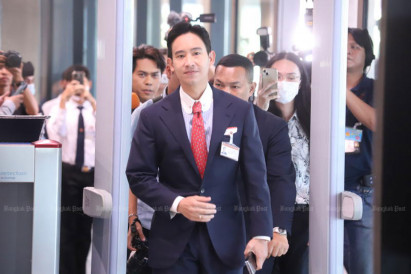Eight coalition parties will meet Tuesday to decide whether to renominate Move Forward leader for second PM vote

Move Forward Party (MFP) leader Pita Limjaroenrat admits the country can’t wait much longer for a new government, saying that if he cannot overcome Senate opposition to his bid to be prime minister, partner Pheu Thai should be given a chance.
Mr Pita made the comment in a video posted on his official Twitter account on Saturday, as the eight coalition parties prepare for a meeting on Tuesday to decide on their next steps.
The main topic of discussion will be whether to renominate Mr Pita for prime minister in parliament on Wednesday, after he fell well short of a majority on his first try on Thursday.
“We have a few chances left to fight together in two battles to lead to the successful establishment of a government according to public opinion,” Mr Pita said.
“The first battle … is the vote for prime minister on July 19, and the second is a proposed amendment to Section 272 of the constitution to cut the power of senators to choose the prime minister forever.
“Both battles will never be victorious if we cannot change the mind of the senators to be on the side of the people.
“If we do our best in these two battles, and it is clear that the progressive party does not really have a chance to become a leader in forming a government, I am ready to open … the way for the Pheu Thai Party as a leader in establishing a coalition government of 8 parties under the MoU we made together.
“All the representatives of the Move Forward Party are ready to support candidates for prime minister from the Pheu Thai Party.
“But until that day we definitely won’t give up.”
Key Pheu Thai and Move Forward figures held talks on Friday night to discuss the second round of the voting and evaluate the situation, said a source at the eight-party coalition.
Representing the MFP were secretary-general Chaithawat Tulathon and deputy leaders Picharn Chaowapatanawon and Sirikanya Tansakul. Pheu Thai leader Cholnan Srikaew, deputy leader Phumtham Wechayachai and secretary-general Prasert Chantarauangthong joined them. The discussions took about 1.45 hours.
Mr Pita, 42, the sole prime ministerial candidate, won 324 votes in favour, against 182 against and 199 abstentions, from the 705 members participating in Thursday’s parliamentary vote. He needed 375 votes — a simple majority of the 749 combined House and Senate seats – to win the office.
He received 311 votes in favour from MPs and and 148 against, with 39 abstentions. He received just 13 votes in favour from senators, 34 against and 159 abstentions. Forty-three senators were absent.
During the talks on Friday, the MFP and Pheu Thai strategists discussed an issue raised by some parliamentarians, as to whether the same motion could be repeated on Wednesday.
They evaluated what the senators might do at the next meeting, and also whether the parties from the outgoing government might nominate a PM candidate. The meeting did not decide whether the coalition would renominate Mr Pita, said the source, pending talks with other coalition partners.
Pheu Thai also reportedly disagreed with Move Forward’s move to amend Section 272 of the constitution to strip the military-appointed senators of their power to co-select the prime minister.
Doing so would be an uphill task because a motion on this issue requires at least 84 votes from the Senate. (Story continues below)

Pol Gen Sereepisuth Temeeyaves, leader of the Seri Ruam Thai Party, attends a meeting at the Move Forward Party headquarters on July 2. (Photo: Pattanapong Hirunard)
‘Anyone could be nominated’
Pol Gen Sereepisuth Temeeyaves, leader of the Seri Ruam Thai Party, one of the eight coalition allies, said trying to change Section 272 was futile and could be viewed as a selfish move by the MFP.
As for Wednesday’s vote, anyone could be nominated because there are no specific regulations governing the process, he said.
Parliamentarians could nominate Gen Prawit Wongsuwon, the prime ministerial candidate of the Palang Pracharath Party, or even Gen Prayut Chan-o-cha. The latter has said he’s retiring from politics but he is still on record as the prime ministerial candidate of the United Nation Party.
In any case, he thinks Mr Pita’s chances of victory are slim.
He dismissed the possibility that the coalition might change strategy by picking Pheu Thai candidates Srettha Thavisin or Paetongtarn Shinawatra, saying Pheu Thai would continue to give its full support to the MFP.
But if the vote on July 19 fails to produce a prime minister, “the two parties have to hold talks about whether MFP will move back so Pheu Thai can nominate its candidate”, he said.
“Though there is a change in the nomination, Pheu Thai would still stay with the MFP. They have kept saying that they will stay together. If they fail to honour their promise, they cannot be in a relationship. The two parties must constantly hold talks,” said Pol Gen Sereepisuth.
Some political analysts have said that even Pheu Thai might find senators hostile to its candidate if the party remains in an alliance with Move Forward. Much of the opposition to Mr Pita has been linked to his party’s desire to amend Section 112 of the Criminal Code, the lese-majeste law.
In the end, Pol Gen Sereepisuth conceded, Pheu Thai might have to form a government with Bhumjaithai, the Democrats or other parties to secure the 376 votes for its candidate.
But even if Move Forward ended up in the opposition, he said, it should still support the formation of a Pheu Thai Party government to facilitate future collaboration.

